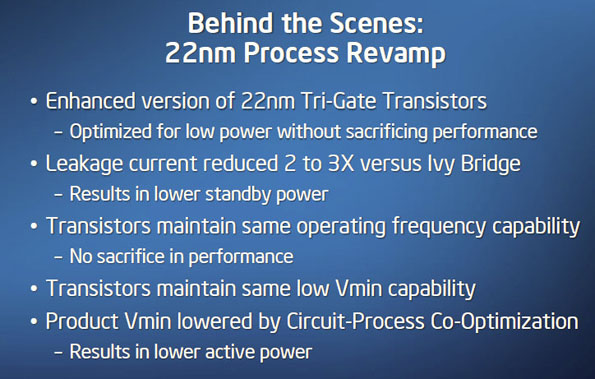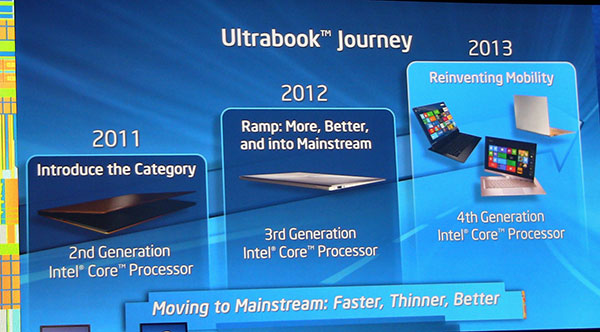Intel Claims Haswell Architecture Offers 50% Longer Battery Life Versus Ivy Bridge
With its soon-to-be-released Haswell microarchitecture, coming to us in the form of the 4th generation Core CPUs, Intel hopes to reaffirm our belief that it's the leader in processor technology. Haswell's launch comes at a time when the company is trying its hardest to make a major impact in the non-notebook mobile markets, and as this microarchitecture is designed to be extremely scalable, we'll assuredly be seeing some Haswell-equipped tablets later this year.
As we learned at Intel's Developer Forum last fall, the company's aiming to "Reinvent Mobility" with Haswell. As with any major microarchitecture launch, we'd expect the usual 10~15% performance gains, but here, Intel has put its efficiency focus into overdrive. Haswell should provide 2x the graphics performance, and it's designed to be as power efficient as possible - it even puts previous generations to relative shame.

As Marco mentioned in his report from IDF, "The goal during Haswell’s design phase was to not only increase performance per watt, but to do so while improving power efficiency by roughly 20x with some workloads" - that's rather staggering. As we can now share, the company has further gone on to state that Haswell should enable a 50% battery-life increase over last year's Ivy Bridge. If the company delivers on this promise, then users stand to greatly benefit while its leading competitor might have to go back to the drawing board.
There are a couple of reasons why Haswell is so energy-efficient versus the previous generation, but there's one major one: the moving of the CPU voltage regulator off of the motherboard and into the CPU package, creating a Fully Integrated Voltage Regulator, or FVIR. This is a far more efficient design than before; integration consumes less power and it greatly improves operational efficiency. In addition, because we're once again moving something off of the motherboard, we're inching our way towards even smaller products, or motherboards of the same size that may have added functionality.

Thanks also to the use of "enhanced" tri-gate transistors, current leakage has been reduced by about 2x - 3x versus Ivy Bridge - an enormous improvement for just a single generation.
Based on the paper specs alone, Intel looks to have a winner with Haswell. The promises of battery-life being improved by up to 50% is just one thing, but there's so much more to like. The fact that Haswell can also idle for up to 20x as long in a deep-sleep mode is also important. Just imagine what this could do for tablets, a la Microsoft Surface.
Given all you know so far, are you planning to make the upgrade to Haswell?

